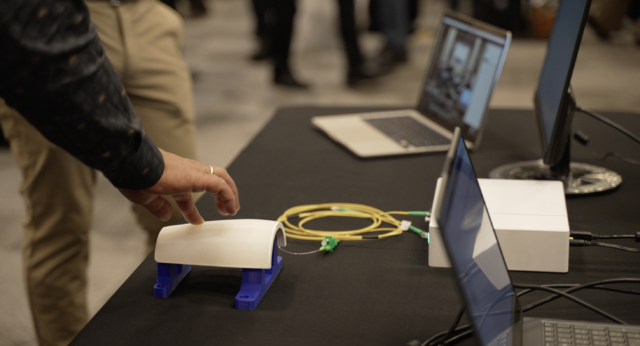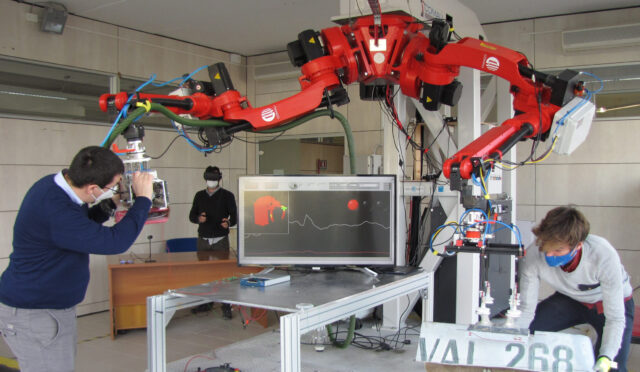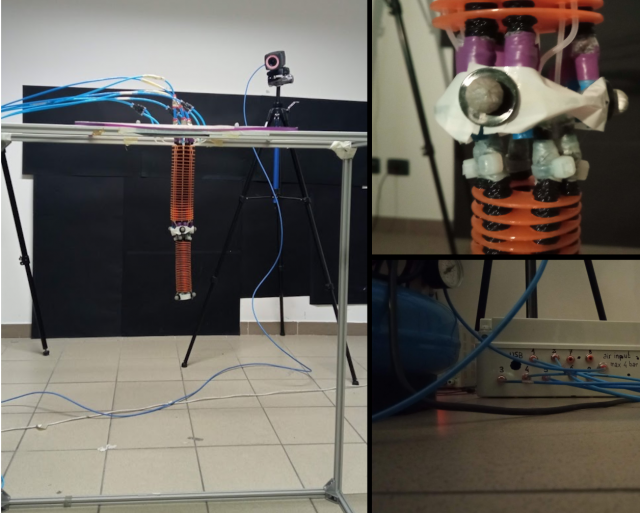A Novel Tip Positioning Control Algorithm for advanced Colonoscopy tested on a TERRINet platform
TERRINet SUCCESS STORY: A novel algorithm for control of growing soft-continuum robots was tested in the framework of the TERRINet Project. The robotic platform STIFF-FLOP available at the BioRobotics Institute of the Scuola Superiore Sant’Anna (Pisa, Italy) was used to implement the research proposal. The experimental results have targeted the scientific challenges for a more accurate colonoscopy performance.

Burcu Seyidoğlu. A young researcher and M.S. Student of Mechanical Engineering Department at Boğaziçi University in Turkey. She has been involved in a research project to develop a novel robotic colonoscopy device for painless, perforation-free, and hemorrhage-free colonoscopy.
Burcu’s main contribution to the project was a novel tip positioning control algorithm, which enabled a more accurate guide of colonoscopy devices throughout the colon.
The scientific contribution of this algorithm consists of two key segments: (1) ability to enhance position accuracy by deformation correction, (2) consideration of external loads when calculating the robot’s tip position.
Burcu applied to the first TERRINet Open Call for TERRINet Trans-National Access because she was interested in challenging the performance of the algorithm on a more advanced platform. Her key research question was whether the algorithm exchange could result in even more increased precision, accurateness and robustness of the end-effector.
A FREE-OF-CHARGE ACCESS TO 100+ ROBOTIC PLATFORMS
Among the wide portfolio of TERRINet platforms available for access, Burcu decided to test her algorithm on the omnidirectional soft robotic arm Stiff-Flop Soft Manipulator. The platform has revealed a perfect match for Burcu’s experiments. Indeed, the Stiff-Flop Soft Manipulator is widely recognized as a platform suitable for control algorithm testing.
The Stiff-Flop Soft Manipulator is offered by the BioRobotics Institute of the Scuola Superiore Sant’Anna (Pisa, Italy). The BioRobotics Institute is an Italian research leader in the field of biorobotics with high expertise in surgical robotics, neural engineering, cognitive systems, soft robotics, etc..
ALGORITHM IMPLEMENTATION BY USING THE STIFF-FLOP PLATFORM
With the support of highly qualified researchers from The BioRobotics Institute, Burcu set a three-phase model for algorithm implementation on the Stiff-Flop Soft Manipulator.
The first phase focused on the study and the understanding of the existing Stiff-Flop’s algorithm. Based on the results of silicon’s shore hardness effect on bending and stiffening the robot, a code for Stiff-Flop’s tip positioning was developed. As displayed in Picture 2, the difference between the positioning coordinates of the end-effector (tip) and the desired position was less than 5%. The results was considered as acceptable.

In the second phase, the code developed was implemented on the Stiff-Flop. The end-effector’s (tip) positioning was tested again, this time by applying different pressure values (0, 0.25, 0.50, 0.75 and 1 bar) to the robotic chambers. The results showed (Picture 3) that position errors up to 0.5 bar were acceptable, whereas greater errors resulted in leakages of the chambers pressure, followed by undesired bending that affected position results.

The third phase was devoted to end-effector (tip) position testing by using Aurora magnetic tracking sensor (Picture 4). The aim was to compare the errors between sensor values and algorithm values to improve the algorithm performance.

Picture 4: Stiff-Flop module and Aurora magnetic tracking sensor.
DID THE EXPERIMENT SUCCEED?
The experimental results showed that:
- algorithm implementation in a different soft robot is possible, although additional applications of material modeling are required (such as Ogden Material Model);
- end-effector position mistakes occurred due to load consideration into position calculations. The test showed that the end-effector load consideration is not required when implementing the algorithm on light-weighted manipulators, such as Stiff-Flop;
- the application of a magnetic sensor to Stiff-Flop requires a more effective and vibration-free experimental setup since such circumstances can unintentionally affect the results.
CAN TERRINet TNA SCALE YOUR SCIENTIFIC CAREER?
Burcu evaluates her overall TNA experience as remarkable since it allowed her to work with highly qualified researchers in the field of soft robotics and to conduct the experiment on an innovative forefront platform, such as the Stiff-Flop soft manipulator.
She was able to expand her knowledge in the field of soft robotics, especially about stiffness variations, hyper-elastic material modeling, and shore hardness.
She also had the opportunity to use the equipment such as Aurora magnetic tracking sensors and to design a setup for precise position values for the first time.
Burcu recommends applying, to all of you EARLY-STAGE RESEARCHERS, since this opportunity can support your persuasion of a scientific career.
Why not try to submit your application to the TERRINet Open Calls? The forthcoming application deadline is January 31, 2020. The TERRINet Project can sponsor your stay. Check the eligibility and conditions on www.terrinet.eu.






